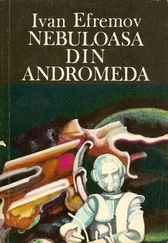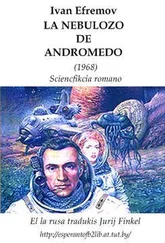Ivan Yefremov - Andromeda (A Space-Age Tale)
Здесь есть возможность читать онлайн «Ivan Yefremov - Andromeda (A Space-Age Tale)» весь текст электронной книги совершенно бесплатно (целиком полную версию без сокращений). В некоторых случаях можно слушать аудио, скачать через торрент в формате fb2 и присутствует краткое содержание. Город: Moscow, Год выпуска: 1959, Издательство: FOREIGN LANGUAGES PUBLISHING HOUSE, Жанр: Фантастика и фэнтези, на английском языке. Описание произведения, (предисловие) а так же отзывы посетителей доступны на портале библиотеки ЛибКат.
- Название:Andromeda (A Space-Age Tale)
- Автор:
- Издательство:FOREIGN LANGUAGES PUBLISHING HOUSE
- Жанр:
- Год:1959
- Город:Moscow
- ISBN:нет данных
- Рейтинг книги:5 / 5. Голосов: 1
-
Избранное:Добавить в избранное
- Отзывы:
-
Ваша оценка:
- 100
- 1
- 2
- 3
- 4
- 5
Andromeda (A Space-Age Tale): краткое содержание, описание и аннотация
Предлагаем к чтению аннотацию, описание, краткое содержание или предисловие (зависит от того, что написал сам автор книги «Andromeda (A Space-Age Tale)»). Если вы не нашли необходимую информацию о книге — напишите в комментариях, мы постараемся отыскать её.
Andromeda (A Space-Age Tale) — читать онлайн бесплатно полную книгу (весь текст) целиком
Ниже представлен текст книги, разбитый по страницам. Система сохранения места последней прочитанной страницы, позволяет с удобством читать онлайн бесплатно книгу «Andromeda (A Space-Age Tale)», без необходимости каждый раз заново искать на чём Вы остановились. Поставьте закладку, и сможете в любой момент перейти на страницу, на которой закончили чтение.
Интервал:
Закладка:
“It would have been just as impossible to return to a pre-machine age civilization, like that of antiquity, although some people did dream of it.”
“Of course. Instead of the civilization of antiquity they would have been faced with a terrible famine. Those were individualist dreamers who did not want to understand that history does not turn back.”
“I’m not insisting that there are armaments in there,” said Veda, “but there is every reason to suppose there are. If the men who devised this cache made the mistake that was typical of their day in confusing culture and civilization and ignoring the absolute necessity of training and developing a man, they would certainly not have seen the vital necessity for preserving works of art, literature or research far removed from current needs. In those days science was divided into useful and useless sciences and no thought was given to their unity. There were branches of art and science that were regarded as being merely pleasant but by no means an essential or even useful accompaniment to the life of mankind. Here, in this cave, the most important things are preserved, that’s why I think of weapons, no matter how foolish and naive that may seem to us today.”
Veda stopped talking and stared at the door.
“Perhaps that’s just a cipher lock and we can open it by listening to it with a microphone,” she said, suddenly, walking over to the door. “Shall we risk it?”
Miyiko jumped between her friend and the door.
“No, Veda, why take such a foolish risk?”
“It seems to me that the roof of this cave is very insecure. We’ll go away from here and we’ll never have a chance to come back. Listen!..”
A diffused and distant sound from time to time penetrated into the cave in front of the door. It came sometimes from below, sometimes from above.
Miyiko, however, was adamant, she stood with her back to the door and her arms outstretched.
“You think there are weapons in there, Veda. If there are they must be well protected. No, no… it’s an evil door, like many others.”
Two days later a portable X-ray reflector screen to study the mechanism and a focussed high-frequency radiator for the molecular destruction of parts of the door were brought into the cave. They did not, however, have time to set their apparatus to work.
Suddenly an intermittent roar resounded through the caves. Strong earth tremors underfoot sent the people who were in the third cave running instinctively to the exit.
The noise increased until it became a dull rumble. The whole mass of fissured rock was apparently settling along the line of the fault at the foot of mountains.
“Save yourselves, everybody get out,” shouted Veda and her people ran to the robot cars, directing them towards the entrance to the second cave.
Hanging on to the cables of the robots they scrambled out of the well. The noise and the tremors of the stone walls followed close on their heels and, at last, overtook them. There came a fearful crash as the walls of the second cave tumbled into the abyss that had formed where the wall had been seconds before. The air blast literally carried the people together with a shower of dust and rubble into the first cave. There the archaeologists threw themselves on the floor and awaited death.
The clouds of dust began to subside. Through the dusty haze it could be seen that the stalagmites and the niches had not changed their form. The former grave-like silence returned to the caves.
Veda came to and stood up, trembling from the reaction. Two of her assistants took hold of her but she shook them off impatiently.
“Where’s Miyiko?”
Her friend was leaning against a low stalagmite carefully wiping the dust from her neck, ears and hair.
“Almost everything has been lost,” she said in answer to an unasked question. “The impassable door will remain closed under a four-hundred-metre thick layer of stone. The third cave has been completely destroyed but the second can be excavated. There and in this cave are the things of greatest value to us.”
“You’re right.” Veda licked her dry lips. “We were wrong in dallying and being over-careful. We should have foreseen the fall.”
“You had only unfounded instinct to go on. But there’s nothing to worry about, we would hardly have tried to prop up those masses of rock for the sake of very doubtful treasures behind that closed door. Especially if it is full of worthless weapons.”
“But suppose there are works of art there, inestimable human creations? We could have worked faster!”
Miyiko shrugged her shoulders and led the depressed Veda in the wake of their companions, out into the magnificence of a sunny day, to the joy of clean water and an electric shower to drown all pain.
As was his habit, Mven Mass strode bade and forth in the room that had been allotted him on the top floor of the History House in the Indian Section of the northern inhabited zone. He had arrived there but two days before after having finished work in the History House in the American Section.
The room, or verandah with an outer wall of polarizing glass, looked out on the blue distance of the hilly plateau. Mven Mass from time to time switched on the cross polarization shutters. The room was plunged into grey gloom and pieces of old cinema films, sculptures and buildings that he had selected appeared on the hemispherical screen. The African watched them and dictated notes for his future book to a robot secretary. The machine printed and numbered the sheets, folded and sorted them according to subject matter, descriptions or generalizations.
When he grew tired Mven Mass switched off the shutters and walked over to the window to stare into the distance with unseeing eyes as he stood for a long time thinking over what he had seen.
He could not help but feel amazed that much of mankind’s recent culture had already passed into the limbo. Verbal finesse that had been so typical of the Era of World Unity, oral and written whimsicalities that had at one time been regarded as the hallmark of a good education, had completely disappeared. Writing for the sake of beauty, so widespread in the Era of Common Labour, had gone and with it the juggling with words that went by the name of witticism. Still earlier the necessity to hide one’s thoughts, an important matter in the Era of Disunity, had ceased to exist. All talk had become simpler and terser and it seemed that the Great Circle Era would become the era of the third system of signals — comprehension without words.
From time to time Mven Mass- turned to the ever wakeful mechanical secretary with new recordings of his thoughts.
“The fluctuating psychology of art had its beginning in the second century of the Great Circle Era and was founded by Liuda Pheer. She first gave a scientific proof of the difference in the emotional perception of men and women and laid bare that sphere that had for centuries been regarded as the semi-mystic subconscious. The proofs she offered for the understanding of her contemporaries, however, constituted the lesser part of her work. Liuda Pheer did more — she indicated the main series of sensual perceptions that made it possible to achieve similarity in the perception of the two sexes.”
A ringing signal and a green light suddenly called Mven Mass to the televisophone. A call that came during working hours meant something very urgent. The automatic secretary was switched off and Mven Mass hurried downstairs to the room where long-distance calls were received.
Veda Kong, with bruised and scratched cheeks and with deep shadows under her eyes, greeted him from the screen. Mven Mass was pleased to see her and held out his huge hands to her, causing Veda’s worried face to break into a faint smile.
“Help me, Mven. I know you’re working but Darr Veter isn’t on Earth and Erg Noor is far away; besides them you’re the only one I have to whom I can turn with any request. I’ve had a misfortune.”
Читать дальшеИнтервал:
Закладка:
Похожие книги на «Andromeda (A Space-Age Tale)»
Представляем Вашему вниманию похожие книги на «Andromeda (A Space-Age Tale)» списком для выбора. Мы отобрали схожую по названию и смыслу литературу в надежде предоставить читателям больше вариантов отыскать новые, интересные, ещё непрочитанные произведения.
Обсуждение, отзывы о книге «Andromeda (A Space-Age Tale)» и просто собственные мнения читателей. Оставьте ваши комментарии, напишите, что Вы думаете о произведении, его смысле или главных героях. Укажите что конкретно понравилось, а что нет, и почему Вы так считаете.











